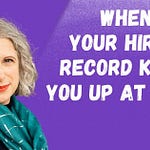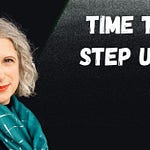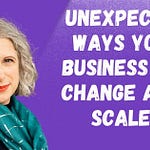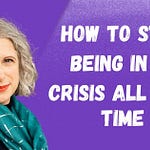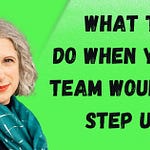Welcome to a free edition of Start Up To Grown Up: Your source for ideas, insights and tactics to take back control of your business and scale it sustainably and profitably by Heather Townsend, award-winning author of The Accountants’ Millionaires’ Club and Founder of The Accountants’ Growth Club
It has been ten days since that appointment.
Ten days of knowing that my life has to change.
Ten days of knowing I have a diagnosis of Fibromyalgia.
And ten days of knowing that whilst I need to pace myself, I have been dire at doing it.
This is not due to a lack of trying to pace myself. I’ve been an abject failure at doing it. If you know me, you’ll know I don’t like failing.
This is a follow-up to my last article, ‘What I did next when my rheumatologist told me what was wrong with me’.
If you are anything like me, your entire career and success to date have been built on one principle.
You work hard.
You are driven.
You push through.
In fact, you know that when the chips are down, you are probably at your best and will save the day.
You’ve built a successful business because you have the grit and determination to see things through, no matter what. That strength is your identity. It is what now defines you.
But what happens when that strength becomes your biggest liability? That’s literally the problem I am facing right now.
One that feels insurmountable.
Given what I have shared on this substack, you will know I have no issue with being honest, transparent or vulnerable. But this? This is another level.
I can pace my physical activity. That part is, if not easy, then at least simple to understand. But I have been terrible at pacing the cognitive load. You just need to look at my diary to see that I am my own worst enemy.
From Monday to Wednesday, it will often be full of carefully paced calls. But it’s not uncommon for me to have done 25-30 hours of work across those 3 days. This can be team calls, client calls, training design work or moving the marketing forward for our business.
Right now, it’s been exacerbated by 2 large 6-figure proposals for both sides of the business. The mental weight of that alone is immense. This is the uncomfortable truth I am facing, and you might be too. My greatest strength, my ability to push and never say die, is now the very thing preventing the profitable, sustainable growth I am trying to achieve in my business.
The rest of this article is designed for anyone like me whose body is showing signs of putting up the white flags, and who needs to learn a healthier way of leading their business. Even if what has got you to where you are now IS the exact problem you need to solve.
The Push-Crash cycle
Hindsight is a wonderful thing. Looking back at the last few years, when I have taken a holiday. It’s always taken me a few days to unwind and then truly relax. But that relaxed feeling? The feeling of being energised and ready for what the world can throw at you on your return? It’s normally a distant memory after a few days of being back at the coal face. And that’s even before I realised I was a Fibro sufferer. And then I’m right back into that day-to-day feeling of hard work being my norm.
I’ve now discovered this has a name. It’s the enemy I am now facing. It’s called the Push-Crash Cycle. For people like you and me, i.e. driven and highly capable business owners, it is the biggest operational risk you can have. It works like this. You have a good day. You feel a glimmer of your old self, a surge of energy and clarity. So you do what you have always done. You spend it all. You attack your to-do list, you clear your inbox, you solve everyone’s problems. You spend all of your energy capital in one go. Which is why, come Thursday, I am running on fumes.
Whilst I used to be able to recover from this, now the result is an energy bankruptcy that lasts for days. What tipped me over the edge? I think it was a gradual ‘boiling frog’ situation. After our marketing manager left in June last year, I took over the majority of her role. And given the state our marketing had been left in, it needed a HUGE amount of TLC and sorting out. That means that working 6+ day weeks (with my work as a councillor on top of this) has been my norm for 12 months. That’s left me with little or no time to recover.
This means that when this Push-Crash Cycle happens, the crash wipes out any gains I have made. Then apply the Fibro thing on top of this, and my disorganised central nervous system doesn’t take much to go into the crash part of the cycle. Of course, I then apply the tried and tested technique of adding adrenaline and caffeine to get through the day, and a vicious cycle of bigger and longer crashes starts to happen.
These crashes and the longer they last? During this time, you are of no use to anyone. The likelihood is that you feel overwhelmed and only able to deal with the day-to-day urgent stuff. Typically, you lack the capacity to think strategically, plan for the future, or identify new opportunities. Even worse, you may become the bottleneck in your own business. For example, can you lead your team effectively? The likelihood is that you get pulled back into old and comfortable behaviours, such as prioritising client work, not delegating or having the time to work ON the business. At a fundamental level, if you can’t lead yourself, you cannot lead your team effectively. You may see this happening because you get pulled back into the daily client work, unable to focus on the strategic initiatives that actually drive the growth and sustainability of your business. This cycle actively prevents the very success you are working so hard to create.
It all starts with a mindset shift
I’ll admit I went straight back into old thinking when approaching this Fibro Flare. I.e. ‘how do I get back to old me with the energy to be a force of nature again’. This is old thinking, and it is going to harm me and send me right back to the beginning again.
I now need to think of myself as CEO of two things. My business and my body. For years, I’ve been carefully attuned to what my business needs. After all, I’ve written about the fact that there is no plan B. I’ve done what it takes to get the business out of the crisis and onto a firmer footing. I now need to apply that same discipline to my body. It is in a crisis, and it needs me to put it back onto a firm footing. No excuses. No, it’s hard. It’s get this right or risk spiralling down into someone who literally can’t physically function.
This means that my most important objective for the next quarter is not ‘get the 2 large proposals over the line’.
It’s "Project Remission".
My goal is to shift from my ‘I’ll just push through and get it done approach’, to one which carefully looks at impact vs effort. And that’s effort on my part.
As a business owner, our most valuable and currently most volatile resource is our own personal energy. It must not get into a long-term deficit.
For me, that’s where I am, in a long-term deficit. I know this is because I poorly manage my energy. I suspect I am in good company with you as well. My new strategy is to protect and grow this resource, because it is the fuel for everything else I want to achieve.
Introducing pacing as a discipline.
This new strategy requires practical, daily action. It is not a vague concept. It needs to be my new operating system.
1. Think of pacing as a budget for your energy
Pacing is not about stopping when you are exhausted. As I have found this week, that is too late. The damage is already done. Pacing is a proactive strategy of stopping before you get tired.
The most effective way to do this is to think of your daily energy as a budget. Let's say you have £100 of energy to spend each day. You must budget for every activity. A difficult client conversation might cost £20. A team meeting where you need to be fully present could be £15. A two-hour block of deep, focused work might cost £40. A stressful commute could be £10. You must track your spending.
Here is the most important rule. On a day you wake up feeling great, like you have £150 in the bank, you must resist the urge to spend it. Stick to your £100 budget. That surplus £50 is not for extra work. It is your profit. You must reinvest it into healing and recovery. This builds your reserves and prevents the crash. It is the exact opposite of running your business too leanly, where a single unexpected event can trigger a crisis.
2. You are now the Chief Delegator.
Your value to the business is your brain, your vision, and your strategy.
It is not measured in your hours at a desk or your ability to do everything yourself.
Moving from technician to business owner is hard, especially when you are constantly pulled back into client work or as I found, a key team member left a bomb in the business and then left . But now, you have no choice but to change. Just pushing through is actually making it worse for you.
A good way of working out what can be delegated is to perform a "Task Audit" this week. Write down every single thing you do. Then, categorise it:
Green: This can be delegated immediately with minimal instruction.
Amber: This can be delegated with some training. A quick video or a simple written process is all that is needed.
Red: Only you can truly do this. These are your high-value, typically strategic tasks.
Your goal is to eliminate almost everything that is not Red from your daily list. This is not shirking responsibility. This is exactly what you should be doing as a leader of your business. It directly tackles the challenge of delegation, which for many of us stems from a fear of losing control or a belief that it is quicker to do it ourselves. This is the only way to free up your time to work ON the business, not just IN it.
It’s not just about the day-to-day tasks in your to-do list. It’s also about applying the same discipline to ad hoc project work. It doesn’t matter who will be doing this project. What does matter is whether this project is the best use of your time and your team members’ time. A good way of doing this is, every 90 days, with your team is to look at the possible projects or stuff outside of the norm that needs to change. Then evaluate all of these on the time and effort versus impact. This will give you the real priorities that you and your team need to work on.
I’ve seen this happen many times over. The business owner gets good at delegating. But then the people beneath them fall over because of all the work landing on them. As a result, the business owner stops delegating or takes stuff over. You need to ensure that your team also applies the same discipline as you and is prepared to push back on whether something needs to be done.
3. Manage your cognitive load
This week, I was running a sales skills training session with a client. The timings of the day all needed to shift back 30 minutes. It was also crucial that we finished on time. As I was managing actors, delegates and the client, these timings needed to be clearly communicated.
I could not add the 30 minutes to my timing. Literally, my brain would not compute. I was staring at my paper and just could not do it. My client had to do it for me. I felt so embarrassed. That was a reminder that my brain fog wasn’t just forgetting the occasional word. It was literally handicapping my ability to do my job.
This brain fog? It’s a sign of an overloaded cognitive server. If you are realising you have problems with brain fog that a dose of HRT can’t shift, here are my tips to support your brain while you recover.
Externalise your brain. Do not rely on your memory for anything. Use tools like Asana, Trello, Microsoft Teams, or even a physical notebook to track every task, idea, and reminder. This is essential to stop crises from forming. But also put in non-negotiable time slots to do this brainstorming, and then filtering and prioritising what needs to be done and when.
Embrace single-tasking and finishing something before starting on something else. Multitasking is a myth. (You know that, and I know that) It is a massive energy drain that leads to inefficient workflows and wasted time. But when you have brain fog, it is so easy to get distracted and hop onto another task or thing. Then before you know it you are multi-tasking. Set a timer for 45 minutes, and work on one thing. Just one. Then take a mandatory ten-minute break where you look away from a screen and do nothing productive.
Schedule your energy. Block out your high-energy tasks, your Red tasks, for the time of day you feel your best. And just as importantly, schedule rest into your calendar. Treat that rest block with the same respect as a meeting with your most important client. This is the only way you will get the most important things done without moving back into the Push-Crash cycle.
4. Use your Executive Assistant to help you
It would be remiss of me not to mention that I have 2 people supporting me to manage my diary. They are both helping me learn to pace myself. But I have to listen to them and not put sessions in my diary when I am meant to be taking a break.
Having someone else to do your diary management is a great tool to support you to pace yourself. You just have to trust them, communicate well with them and then don’t override them!
5. Get in the professionals
The fact that you have got this far normally means you need to admit you need help. For me the professionals will be a therapist to help reframe my unhelpful beliefs and behaviours. For you it may be the personal trainer, business coach or virtual assistant. But the key thing is until you have established new healthy habits, you will need the support of someone else to help you find and implement these habits. With the benefit of hindsight, I realise I have done this role with my clients many, many times. It’s just ironic that it's me who now needs to do this to myself!
Your new Key Performance Indicators
As driven business owners, we are naturally highly driven and often goal-oriented. That means in these situations, we need a new definition of what winning looks like.
The Old Win for me was getting back to my old self. It’s what I really want to be able to do. It meant having the capacity and capability to work 12-hour days, hitting every deadline through sheer force of will, and being the hero who saves the day. When I read that back, it’s not really a healthy attitude, is it!
The New Win for me is completely different. It’s about Project Remission. In three months, the win is that I need to have successfully implemented my pacing strategy. That means when I get to the other side of summer, I haven’t had a major energy crash in weeks. But it also means my team is functioning more autonomously and effectively because I’ve had the time and energy to lead them properly. I will feel in control of my Fibro, not controlled by it. This will then mean that my business is not just surviving, it is growing more sustainably because its leader is no longer its biggest risk factor. This will actually accelerate our journey to becoming an Employee-Owned Trust.
Funnily enough, this shift in reframing what I wanted to achieve in 90 days was really empowering for me. I’ve gone from a reluctant participant in Project Remission into a fully paid-up participant who is raring to go..
Final thoughts
Whilst this article is about my recovery from a massive Fibro flare, it’s also about you, and how you are managing your body.
The key lesson is that if you are going to move your business from ‘teenager’ to ‘mature adult’ you now have 2 jobs. To be the CEO of your business and the CEO of your body. You can’t drink from an empty cup.
Think of this as a change in your role and responsibilities. You are an expert at solving complex problems. That is what you do. This is simply a new one, with a new set of rules. True, lasting success will not come from your willpower or ability to ‘push through’ anymore. It will come from you really managing your time, energy and focus.
Yes, there will always be those temporary phases where you do need to push through. But this is why you’ve built a bank of energy in reserve to get the ship steadied again.
Your actions this week
If you were evaluating how well you are managing your energy levels, focus and personal capacity, how would you score yourself? What do you need to do or reframe to ensure that your body's emotional, physical and mental reserves are topped up and you are not running near empty?









